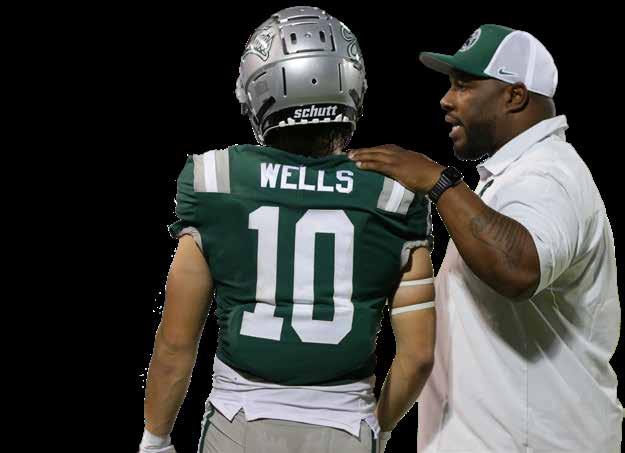2 minute read
Evolving the Premiere Learning Experience
Next Article
Learning is not learning if it remains static. Questions change as knowledge changes. That is why De La Salle actively seeks ways to evolve and optimize its curriculum – to meet both the changing needs of students and the world beyond high school.
In recent years there have been significant curriculum redesigns and course updates within multiple departments. For instance, the Religious Studies Department has placed an emphasis on projects and interdisciplinary learning opportunities. The Visual and Performing Arts Department has added semester elective courses so that it can offer students, who may not have had access to a well-funded and robust arts education before attending De La Salle, both fundamentals and flexibility to grow as art learners.
The English Department evaluates courses to provide more choices that appeal to student interest. This year, it is offering its second interdisciplinary course co-taught by both English and Social Studies teachers: Literature, Conflict,andtheHumanExperience.At the same time, De La Salle has built a fabrication studio to optimize interdisciplinary learning and making, and has also established a Computer Science program.
Now – following multiple years of research, as well as data analysis from various student surveys, the school’s recent accreditation process (2022), and guidance from De La Salle’s Strategic Plan – the Curriculum Innovation Committee has identified the skills that students need by the time they graduate. Equally important, it has created a curriculum roadmap to cultivate these skills. It plans to execute these changes in three phases, providing equitable access for all students.
Critical Competencies
Communication Literacy
Oral, written, digital, graphic, reading, non-verbal, listening
Sophisticated Thinking
New ideas, analytical thinking, ability to form judgments and hypotheses, cognitive flexibility, informed media literacy, problem-solving
With the college admission process continuing to broadly and rapidly change in the post-pandemic world, De La Salle students will be uniquely equipped to demonstrate scope and rigor in their academic course selection. This is something that is now just as attractive, if not more attractive, than their GPA for college acceptance. “Changes in SAT/ACT testing policies in recent years have led to a greater focus on the applicant’s high school academic record,” says Lisa Sciacca, Co-Director of College Counseling. “Colleges and universities want to see that students are taking a wide range of college prep courses, and they are challenging themselves with advanced coursework, especially in areas of interest.”
So what will a premier learning experience look like in 2023 and beyond, as our Strategic Plan calls for? It will start with an academic schedule that is spread across seven periods for sophomores and freshmen. Moving to a seven-period day will directly meet student requests for more choices. It also allows for additional and expanded classes that tap into teachers’ strengths and create rich and engaging curricula that help students be successful learners.
Rising sophomores, juniors, and seniors are already set to take advantage of the curriculum changes for the next school year. Recently, during course registration, they were given more space to select courses based on their interest. They could sign up for more Health, Physical Education, and Recreation (HPER) classes like Weight Training, Fitness, and Sports Medicine. There was also more room to fit in classes like Robotics, EADD (Engineering, Architecture, Drafting, and Design), Instrumental Music, and Music Theory, as well as classes like Screenwriting, AP Human Geography, AP Art History, and AP European History. They also had the opportunity to take advantage of additional sections for Psychology and Leadership.
At the same time, multiple sections of Study Hall were added for students who need a little break in the middle of the day or who need help to get themselves organized.
“The new targeted classes are a real opportunity for our students to build out their academic acumen, their academic interests, and think about how they learn as students,” explains Dr. Heather Alumbaugh, Vice President for Academic Life. “We want to help and encourage our students to go for the perfect combination of interest and reach. We want to see them reaching for something that may be a challenge for them but also be motivated by their interest.”
Phase Two and Phase Three of the Curriculum Innovation Committee’s plan will be shared at the appropriate time.










